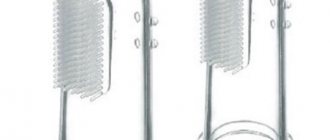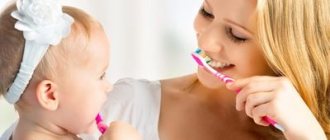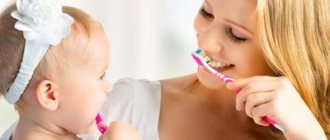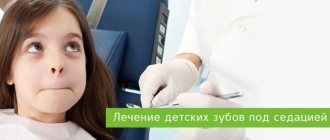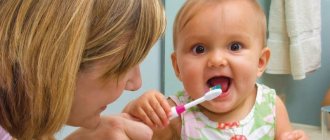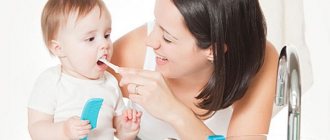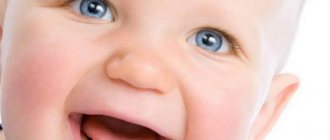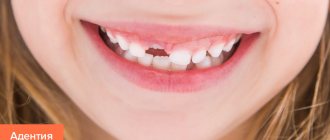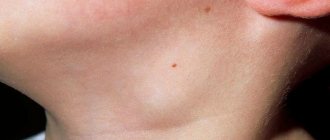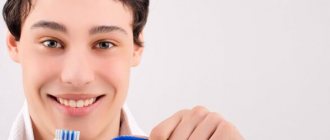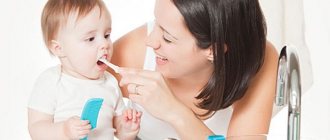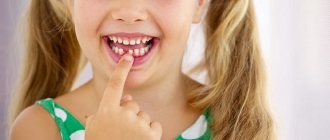How to make teething easier, rules for caring for first teeth
Sleepless nights, but such long-awaited first teeth! We rejoice at every white lump in our child’s mouth. And every time we ask ourselves the question: “How can I make teething easier for my baby? How to get rid of pain?
At the moment, the International Association of Pediatric Dentistry (IAPD) does not recommend the use of gels based on the anesthetic lidocaine.
Why? After all, each of us wants to make this period easier for the baby. Firstly, the relief will last only 2-3 minutes, and secondly, frequent application of such gels can lead to a toxic effect.
Why should you brush your baby teeth?
Many young mothers believe that brushing their baby teeth is not necessary because they will fall out anyway. However, decaying teeth
are always pain, discomfort and a source of spread of pathogenic bacteria.
How to brush your teeth correctly
How often, what to use, and in what mode is it better to brush your teeth? Detailed instructions for children and adults.
In addition, the early habit of brushing teeth becomes natural for the child and will help him preserve the health of his molars.
How to properly brush children's teeth
There are several general rules for high-quality teeth cleaning, depending on the age of the baby:
- A child under one year old should brush his teeth using a special silicone pad, which is fixed on the parent’s index or thumb.
- After a year, you can use a brush with silicone bristles and a special limiter, gradually switching to classic models.
- From the age of three, a regular brush with soft bristles is used. It is important that its surface is covered only by two dental crowns, otherwise the hygienic procedure will not be effective enough.
A baby brush needs to be changed every 3-4 months. If the service life has not yet expired, but the brush has already become rough around the edges, you should change it, since pathogenic bacteria can begin to form and multiply between the bristles.
How to brush the teeth of a child under 1 year old
Six months is the age when parents should start brushing their child’s teeth every day.
From 6 to 12 months, children are cutting teeth, so during this period it is necessary to sanitize their oral cavity very carefully. The baby cannot yet take part in the hygiene procedure, but can already express his dissatisfaction with sounds and gestures, so the adult should focus not only on the dental cleaning technique, but also on the baby’s sensations.
How to properly brush your first teeth
Key cleaning rules:
- the necessary movements should be sweeping: from the root to the top;
- the finger with the silicone attachment should be in the child’s mouth at an angle of 45 degrees to the gums;
- when processing chewing surfaces, the finger with the nozzle is positioned horizontally and cleans the crown with progressive longitudinal movements;
- The inner surface of the teeth is cleaned with short, quick movements;
- The side teeth can be cleaned using circular movements.
There should be about 10–15 movements per tooth. During the procedure, it is necessary to clean not only the dental enamel, but also the inner surface of the cheeks, tongue and gums. You can also brush your one-year-old child's teeth using special dental wipes, which can be purchased at the pharmacy.
Why you need to teach your child to brush their teeth earlier than one year
You should start brushing your baby's baby teeth when the first incisor appears or even before it fully erupts. Complete oral care will help:
- form the correct bite;
- It is good to clean the oral cavity from cariogenic bacteria;
- prevent various diseases, including caries.
How to brush teeth for children over one year old
A child over 1 year old can purchase their first toothbrush with silicone bristles. It costs more than a regular one, but such a waste of money is justified: a brush with silicone bristles will not injure the child’s teeth and will help to thoroughly clean the gums and cheeks. You can use it to clean even your child’s first teeth. However, such brushes quickly become unsuitable for safe use, so they should not be used for a long time.
Rules for caring for a children's toothbrush with silicone bristles
In order for the silicone brush to last longer, you must follow the following rules for its operation:
- Do not boil or even simply pour boiling water over the brush;
- After each use, you should wash it with soap (baby, tar, laundry).
The brush should not be placed in a case; it should be stored in a closed cabinet, in a glass, separately from the brushes of adult family members.
How are the first teeth cut?
Teaching your child the rules of personal hygiene
Children are taught hygiene procedures from the first days of life. Find out how to teach your child to practice personal hygiene on his own.
The main symptoms of teething in infants are increased salivation and swelling of the gums.
The process is usually uncomfortable for the child and may be accompanied by increased moodiness and crying for no reason, insomnia and loss of appetite. A slight increase in temperature
(up to 38°C) may be a natural protective reaction of the body, but in this case the child should be shown to a doctor.
You can help the baby a little. Buy several teethers
- rubber or plastic toys for the child to bite on.
Chewing rings with liquid inside, which are first placed in the refrigerator to cool, has a particularly soothing effect. Additional methods
: Gently massage the baby's gums with a gauze pad soaked in cold water, or use baby teething gels with anesthetics, which the pediatrician will recommend.
How to teach a child to brush their teeth
Many children under 1 year old, and sometimes older children, do not want to brush their teeth, expressing their dissatisfaction in every possible way. In this case, it is necessary to attract their attention to the hygiene procedure using one of the following methods:
- buy a bright brush with your favorite cartoon character and toothpaste with a pleasant fruity taste;
- invite your child to brush the teeth of his toys;
- brush your teeth with your child and compete with him in the quality and speed of brushing.
Each parent independently decides at what age to start brushing their child’s teeth and whether to use toothpaste, but delay can negatively affect the baby’s health. Parents should not only brush their children’s teeth, but also teach them how to properly care for their mouth on their own.
Dr. Komarovsky talks in more detail about children’s teeth, caring for them and teaching a child to brush:
What foods are good for your first teeth?
Foods rich in calcium
.
First of all, it is cottage cheese and hard cheese. Slightly less calcium is found in milk, fermented milk products, green leafy vegetables, gooseberries, currants, and cherries. Sources of vitamin D, without which calcium cannot be absorbed, are egg yolk and butter. You should include carbohydrate foods in your child’s diet less often: bread, potatoes, and especially sugar and sweet foods. Sweets provoke the active proliferation of bacteria in the mouth, which leads to early caries
. “The longer you don’t offer your child sweets, the better,” says Kuznetsova, “for example, children under three years old should not be given chocolate at all.”
The child does not want to brush his teeth, how to persuade him. Tips and tricks
The condition and future of root teeth depends on proper and timely care of milk teeth. The first teeth that have erupted are carefully wiped with a piece of gauze soaked in water. It is advisable to do this in the morning and evening so that the baby gets used to the mandatory procedure. Correct hygiene in infancy serves as an excellent preventive measure and protects against the possible development of fungal and bacterial infections.
A 1.5 year old baby is already able to perceive and evaluate information. He understands what they want from him and why they take him to the bathroom in the morning. But not everyone is ready for this innovation in their lives and is reluctant to undergo the procedure. During this period, walks, games and cartoons are a priority, so a daily activity in the bathroom may seem boring to many. When attempts to force or persuade are unsuccessful, try to play on children's impressionability. Let's highlight the most popular tricks and tricks that work effectively and help parents teach their child to brush their teeth.
- Diversify and enliven your daily routine. It shouldn't be boring. You can turn on music, read poems, tell fairy tales, and come up with exciting games. Surround your baby with the company of your favorite dolls, bears and bunnies. Make it a fun activity where everyone brushes each other's teeth. If the child likes it, next time you won’t have to persuade it.
- Go shopping for a toothbrush and toothpaste together. There are a lot of tempting and bright children's models for sale. Young children are attracted, first of all, by the appearance of the accessory and the delicious pasta. Usually preferences are on the side of beautiful brushes with your favorite cartoon characters and the sweet taste of the toothpaste composition. But even the most interesting things can quickly become boring, so you can buy several devices at once.
Remember safety. Children often swallow the paste. To avoid harm to the stomach, purchase formulations without fluoride. The brush should be soft so as not to scratch the gums, and comfortable so that the baby can hold it in his hands without any problems.
- Teach the skill of brushing teeth by example. This is one of the best educational approaches, as children love to imitate adults. They copy gestures and behavior, and all movements take root in their consciousness for a long time. Don't close the bathroom door when brushing your teeth. At first, the baby will watch with curiosity. You can be sure that he will want to join and repeat your actions. An excellent type of motivation is the element of competition. Compete to see who can brush longer or who has whiter teeth. In such competitions, children really like to win against adults.
- Don't over-praise! The child must understand that brushing teeth is a mandatory procedure. There is no need to persuade him, encourage him after each attempt and throw around promises. If the smart guy understands that he will be rewarded every time, he will get used to it and will take up the brush only if his next wish is fulfilled.
You can praise for success, encourage and emphasize that clean, white, strong teeth are great. If your arguments do not work, be patient and do not resort to punishment with a belt. This only works at an early age and can lead to the fact that an unpleasant childhood association will cause reluctance to care for the oral cavity in adulthood.
How to care for baby teeth?
From the moment the first baby teeth appear (6-8 months)
, and up to a year, parents should brush the child’s teeth with a special silicone brush placed on a finger at least once a day.
From the age of one year,
a child can brush his teeth twice a day with a very soft children's toothbrush, moving from the gums to the cutting edge or chewing surface of the teeth.
From 2-2.5 years old,
children's gel toothpaste should be used.
The amount of paste per cleaning should not exceed the size of a pea. From the age of 3,
children's teeth are brushed twice a day with a very soft toothbrush and children's toothpaste.
From the age of 2-3 years
, a child can be taught to brush his teeth independently under the mandatory supervision of his parents.
Pediatric gingivitis
As a result of plaque accumulation, your baby may develop gingivitis. When cleaning your child's mouth, pay attention to the condition of his gums. Their redness and swelling are a sign of the onset of the disease. Another symptom is bleeding gums, which you may notice after brushing your teeth.
Regular thorough oral hygiene and professional teeth cleaning at a dental clinic can help you get rid of childhood gingivitis. If the necessary measures are not taken in time, periodontitis may develop, and then the child will require more serious treatment, including surgery.
To keep your baby's gums and teeth healthy, start regular oral care immediately after birth and be sure to take your baby to the dentist before he or she turns one.
Choosing a brush and toothpaste for your baby
How to choose a toothbrush
Conventional, electric or ultrasonic? Soft or hard? Synthetic or natural? Accurate answers to all questions.
A baby toothbrush looks like this.
It has a short working part - from 18 to 25 mm. Until the age of five, a child has a brush with very soft (extra soft) synthetic bristles, and from a later age - with soft bristles with rounded ends. The handle of the children's brush is thicker, with non-slip inserts - this makes it easier for the baby to hold it. Children's toothpastes
are also different from adults. They are low in abrasives, low in fluoride, and contain fruity fragrances and flavors. Look carefully at what age of children this or that toothpaste is intended for.
When should I start using the paste?
Many moms and dads wonder when to start brushing their teeth with toothpaste. Answering it, our expert says that there are no restrictions as such in this sense. The main thing is to choose the right one according to age.
Today there are many types of pastes on the dental market. All of them are divided by age, so the samples intended for babies can be safely used from scratch. They contain no harmful substances, they are absolutely safe, and therefore can be used from the first tooth.
“Children’s toothpaste differs from adult toothpaste in its abrasiveness, or rather, its absence. Children's pastes are not abrasive, they contain less fluoride and do not have whitening properties. They are more gentle and prevent intoxication. Since children love to swallow toothpastes, there is no risk that it will have an undesirable effect,” explains the dentist.
Also, children's toothpastes, as a rule, contain aromatic additives to make the process of brushing teeth more pleasant and attractive for children. Manufacturers add different flavors to their products - strawberry, banana, apple.
You can switch to adult paste gradually, at the moment when the permanent bite of the teeth completely changes, that is, at the age of 12-13.
What parents need to remember
The baby should see the dentist for the first time at six months, and the first tooth should be cleaned with a special brush.
Sweets harm the first teeth, but daily brushing with a special children's brush and toothpaste is beneficial. Tags:
- Hygiene
- Teeth
- Preschoolers
- Babies
- Kuzmina
3 comments • To leave a comment you must be an authorized user
- few Hello everyone. I wanted to recommend a cool service to you. Using this service, you can find out for free on your phone. You can also read reviews about the numbers or leave your own if a scammer calls you. Thank you for reading my post. I create useful services for people. https://kto-zvonil.net https://kto-zvonil.net https://kto-zvonil.net https://kto-zvonil.net https://kto-zvonil.net https://kto -zvonil.net https://kto-zvonil.net https://kto-zvonil.net https://kto-zvonil.net https://kto-zvonil.net
- tancuet massage "methods: gently massage the gums"
- irina_golovleva at 6-8 months a child can be given hard cheese, gooseberries, currants, cherries???????!!!!!!!!!!!!!!!!!!!!!!!!!!! !!!
At what age should a child start brushing his teeth?
You need to start brushing your baby's teeth from the moment they begin to erupt.
At first, it is better to perform manipulations without paste, carefully treating not only the first tooth, but also the gum itself. You can use a special soft baby brush or a silicone pad that is placed on the parent’s finger. The last device will serve not only as a brush, but also as a gum massager, which will ease the pain from teething.
You should act carefully during the cleaning process, since the gums near the cutting tooth are inflamed and painful, so infants may react poorly to the hygiene procedure. But you cannot refuse it: during teething, local immunity deteriorates, so the risk of infection of the enamel increases.
More details about caring for the oral cavity of a newborn are described in the video:
First teeth - important rules
Once your baby's first tooth emerges, usually around 6 months, it's time to start taking care of his teeth. You can use silicone fingertips, a soft toothbrush or antiseptic wipes - all this will help remove plaque from tooth enamel. Before your baby is one year old, you definitely need to visit the Tooth Fairy, a pediatric dentist. A specialist will examine the baby’s oral cavity and give important care recommendations to keep new and future teeth healthy. As a rule, by the age of two, a child’s primary bite is formed, and the number of teeth reaches 20.
Hygiene procedures and age characteristics of the child
At the age of 1 to 2 years, it is unlikely that it will be possible to force children to brush their teeth on their own. When the child picks up the brush for the first time, he will simply play with it. Don't disturb him, let him get used to the accessory. When helping the baby, be careful and careful in your movements. Any discomfort and pain can discourage you from caring for your teeth for a long time.
The ideal age for independent mastery of skills is 2–3 years. At this age, kids go through a very interesting period called “I myself.” They are eager to try everything and they need to take advantage of this moment. Get interested in the process by your own example and show how to properly brush your teeth. If necessary, guide the baby's hand, praise him and never scold him if he fails to cope with the task. It is these first inept attempts that allow you to remember the movements and hone your skills over time.
If a child under 5 years old categorically refuses to go to the bathroom and pick up a toothbrush in the morning, take a break. Let him forget unpleasant associations and impressions. During this period, you can read useful books and unobtrusively offer special educational cartoons, which tell in an entertaining way the importance of daily brushing and caring for your teeth. Tell stories about children who don’t take care of their teeth and show pictures that clearly show what protest can lead to. It is easier to convince, persuade and teach an interested child. The main thing is that the initiative comes from him, otherwise repeated attempts will result in failure.
When teaching a skill, do not frighten children. You won't achieve anything by making up stories about evil microbes and monsters called Caries that come and take your teeth. Horror stories will only do harm and completely discourage you from picking up a toothbrush. Do not traumatize the child's psyche.
There are difficult cases when at 7 years and older children do not want to brush their teeth. Persuasion and coercion will no longer work, but persistence without shouting, hysterics and coercion can be demonstrated in such situations. Go to the dentist. Good children's specialists know what to say about the importance of hygiene procedures and will definitely help with advice.
